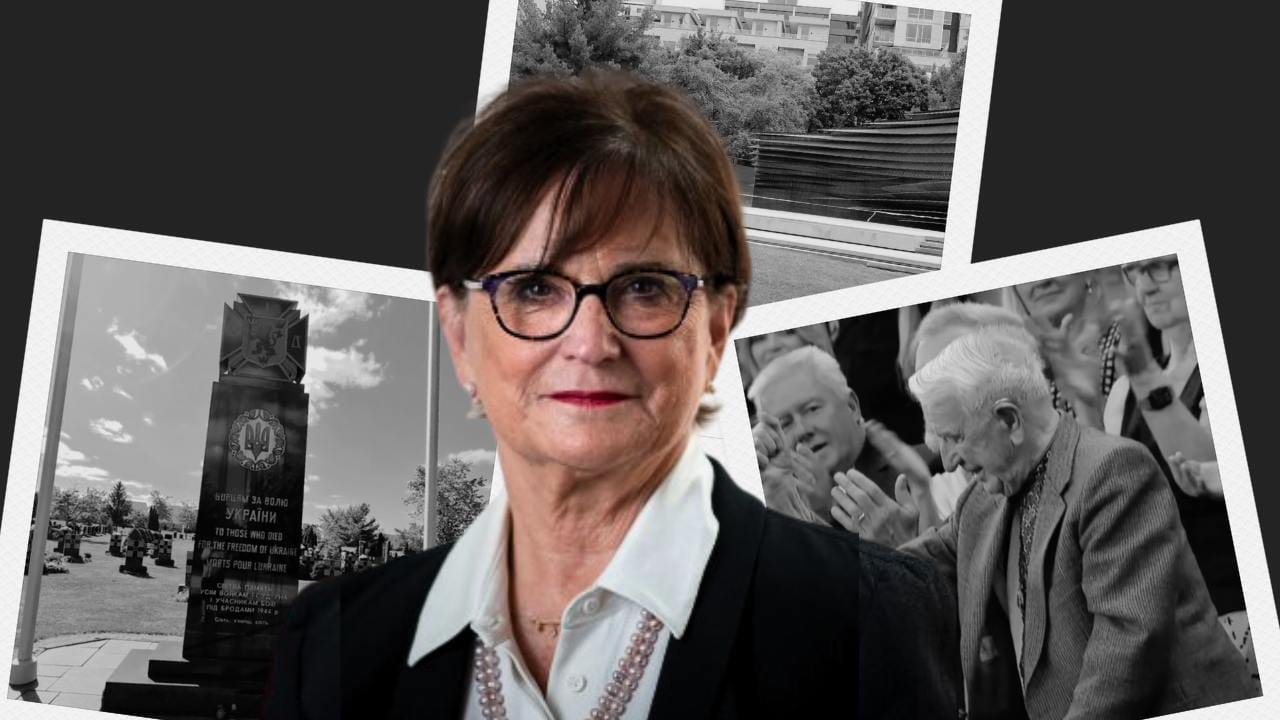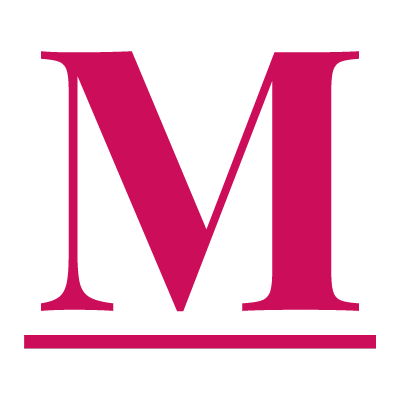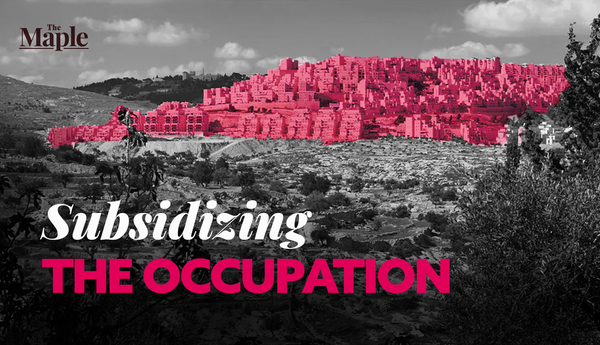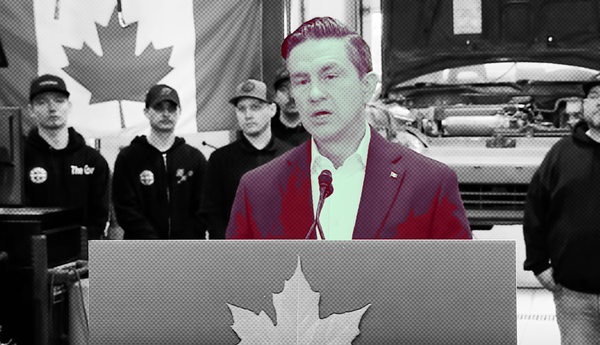The federal government’s controversial envoy for “combatting antisemitism” has said next to nothing about the glorification and protection of Nazi war veterans and alleged war criminals in Canada, an analysis by The Maple of the current envoy’s first year in office has found.
Deborah Lyons, a career diplomat who previously served as Canada’s ambassador to Israel, was appointed as the Trudeau government’s “Special Envoy on Preserving Holocaust Remembrance and Combatting Antisemitism” on Oct. 16, 2023 for a two-year term. The role, which is jointly managed by Canadian Heritage and Global Affairs, was established in 2020, with former Liberal MP and minister Irwin Cotler serving first in the position.
The envoy’s officially stated mandate is to support “efforts to combat antisemitism and hatred domestically, interacting with Canadian institutions and stakeholders to promote Holocaust education, remembrance, [and] research,” with a special emphasis on promoting the implementation of the International Holocaust Remembrance Alliance (IHRA) definition of antisemitism. Critics have long argued that the IHRA definition conflates criticism of the state of Israel with antisemitism, enabling the suppression of pro-Palestinian speech and activism.
The Maple examined every tweet and piece of media Lyons has posted since Oct. 31, 2023, when her Twitter (now known as ‘X’) account was first launched, and searched news archives for stories that mentioned both her name and key search terms related to the glorification and protection of Nazi war veterans and leaders in Canada. The search included opinion articles authored by Lyons herself.
While Lyons has spoken against Holocaust denial and distortion in general, and called for more Holocaust “education,” The Maple found just two instances where Lyons, who is not Jewish, explicitly referred to cases where Nazi war veterans and collaborators have been glorified, applauded, or shielded from public scrutiny in Canada.
In February, Lyons shared a Globe and Mail article about declassified sections of a decades-old government report regarding alleged Nazi war criminals living in Canada. Lyons tweeted that the disclosure “provides [Canada] the chance to reckon with its past to ensure it doesn’t make the same mistakes again.”
Last week, however, The Globe and Mail reported that the federal government would be withholding the names of around 900 alleged Nazi war criminals who found refuge in Canada after the end of the Second World War. While the story quoted several Jewish groups and scholars who were dismayed by the decision, Lyons was not mentioned in the story and has made no public statement about the decision as of the time of this article’s publication.
As reported by the Ottawa Citizen in September, Library and Archives Canada consulted a “discrete group of individuals or organizations” that included members of Canada’s Ukrainian community when determining whether or not to release the approximately 900 names, but did not speak to Holocaust survivors nor Holocaust scholars. Lyons did not comment on that story either.
In August, Lyons told the Ottawa Citizen that a monument at an Estonian-Canadian children’s camp honouring Nazi collaborators “reinforces the importance of comprehensive Holocaust education, not only in our schools, but also among the broader Canadian public.”
But Lyons did not share the story, or mention it through any of her public channels. Her comments in the Citizen story did not include any call to remove the monument.
In December 2023, Lyons attended an IHRA conference in Croatia, tweeting that Canadian representatives took part in discussions dealing with “museums and monuments,” with no further details provided.
The Maple found no direct mention in any of Lyons’ public statements about monuments honouring Ukrainian Nazi collaborators and war criminals in Edmonton and Oakville, Ont., or Ottawa’s Victims of Communism monument, which was slated to honour hundreds of names with potential links to Nazi Germany and collaborationist groups. The monument is being overseen by Canadian Heritage, one of the ministries that Lyons answers to.

Lyons has also made no public mention of “Black Ribbon Day” — which is officially recognized by the federal government — and the related so-called “Double Genocide Theory,” which argues that the genocide of the Jews by the Nazis came after the Soviet Union allegedly committed a genocide against the predominantly Christian population of Western Ukraine.
Critics, including some Jewish scholars and historians, have condemned the theory as amounting to a form of Holocaust revisionism.
The Nazi Parliament Scandal
Lyons began her tenure as envoy just three weeks after members of Parliament gave a standing ovation to Yaroslav Hunka, who was revealed to be a veteran of the Ukrainian Waffen SS unit known informally as the “Galicia Division.”
Lyons’ first statement as envoy, published on Oct. 31, 2023, made no mention of the scandal or its fallout, which included revelations that the Canadian Institute of Ukrainian Studies at the University of Alberta had received over $1.4 million of donations made in the names of Ukrainian Nazi collaborators.
The donations included a $30,000 endowment made in Hunka’s name. The university said it closed the endowment following a public outcry.
While speaking up on some of the above incidents may have been embarrassing to the government that appointed her, Lyons has not shied away from publicly criticizing some of Canada’s policy decisions related to Israel’s war on Gaza.
Last December, when Canada voted for a United Nations General Assembly resolution calling for a ceasefire in Gaza, Lyons tweeted that “many people in the Jewish community [were] disheartened and hurt” by the decision. “I have heard from so many of you and understand your concerns,” she added.
Besides condemning violent antisemitic attacks, Lyons’ other public-facing work to date has included defaming pro-Palestine activism, meeting with pro-Israel lobby groups and Israeli government officials, engaging directly in pro-Israel activism, attending pro-Israel events, and advancing the highly controversial IHRA definition of antisemitism.
Lyons has retweeted statements explicitly conflating anti-Zionism with antisemitism, and has shared debunked narratives about the Hamas-led attacks on Israel on Oct. 7, 2023.
In August, Lyons prompted particularly strong criticism when she said in an interview with the radically pro-Israel National Post: “Why is Canada having this unprecedented surge in antisemitism right now? What is it about the make-up of our society? What is it about our push for diversity and inclusivity? And what is it about our demographics?” Her comments were fiercely criticized for invoking dog whistles about immigration and its alleged relationship to antisemitism in Canada.
In June, the advocacy group Canadians for Justice and Peace in the Middle East (CJPME) published a report that condemned Lyons for engaging in “regular public commentary to demonize pro-Palestine demonstrations, frequently mischaracterizing protests to falsely paint them as antisemitic.”
In its analysis of Lyons’ social media activity between October 2023 and March 2024, CJPME found that the envoy consistently misrepresented pro-Palestine activities and slogans, and dedicated a significant portion of her role to collaborating with Israeli government officials.
Most recently, Lyons published the “Canadian Handbook on the IHRA Working Definition of Antisemitism,” which had the stated goal of helping Canadians understand “what the definition means” and to provide “non-prescriptive guidance on how the definition can be used.”
The handbook was strongly criticized, including by anti-Zionist Jewish groups like Independent Jewish Voices Canada (IJV), which stated: “The adoption of the IHRA working definition is itself antisemitic, because it conflates critique of Israel with racism toward Jews as a whole, and promotes anti-Palestinian racism. IHRA makes it impossible to fight real antisemitism while also engaging in truthful political speech about Israel’s policies.”
The handbook made no mention of the Nazi Parliament scandal, or the honouring of Nazi collaborators through monuments and statues in Canada. Instead, the handbook claimed that “drawing comparisons of contemporary Israeli policy to that of the Nazis” is an example of antisemitism.
The handbook stated: “These comparisons often form a cycle of positive reinforcement with Holocaust denial and minimization. They are especially harmful due to the intergenerational trauma from the Holocaust that many Jewish people carry.”
The handbook noted that “Denying the fact, scope, mechanisms (e.g. gas chambers) or intentionality of the genocide of the Jewish people at the hands of National Socialist Germany and its supporters and accomplices during World War II (the Holocaust) [emphasis added]” is another example of antisemitism, but did not cite any examples of Nazi collaborators having their roles in the Holocaust whitewashed by some present day nationalist diaspora groups in Canada.
The handbook cited an article published by Canadian Dimension as an alleged example of antisemitism for arguing that “Israel’s lebensraum master plan for Gaza, borrowed from the Nazi’s depopulation of Jewish ghettos, is clear.”
Absent from the handbook’s citations was a highly controversial 2022 op-ed published in the Ottawa Citizen, in which a Ukrainian nationalist and Royal Military College professor explained that he wouldn’t toss “tomato soup” at a Holocaust monument in Ottawa because there are “too many hungry people out there.”
The author’s objection to the monument was that, in his view, it didn’t sufficiently acknowledge the suffering of Ukrainians during the Second World War.
The handbook cited some examples of neo-Nazi activity in Canada, but The Maple found no direct statements from Lyons regarding neo-Nazism and the far-right in Canada in her other public channels. The handbook cited “holding Jews responsible for the Russian invasion of Ukraine” as another example of antisemitism, but did not attribute that belief to any particular group or political movement.
Notably, the handbook suggested that describing Zionism as a “racist & violent settler-colonial project” is antisemitic, despite that view being advocated by some anti-Zionist Jews.
Niall Clapham Ricardo, an activist with IJV, told The Maple that as Canada’s ambassador to Israel, Lyons was enmeshed with Israel’s right-wing political establishment, and even hosted a pizza party for Canadians serving in Israel’s military.
“She’s a hawk in many ways with regards to Canada’s position on Israel and on Palestine,” said Clapham Ricardo, who also noted that Lyons supported an injunction against IJV and other pro-Palestine groups that protested events in Montreal marketing Israeli real estate in the occupied Palestinian territories.
Clapham Ricardo said the IHRA handbook gives insufficient attention to the antisemitic threat posed by white supremacist and neo-Nazi groups, which he said should be the main focus of any work countering antisemitism.
“Where I see antisemitism coming from, and where we’re going to see antisemitism coming from in the future, is from those groups,” he said.
As well, he explained, Quebec’s Bill 21, which bans public employees from wearing religious symbols at work, discriminates against Muslims, Jews and other religious minorities. The IHRA handbook does not mention that law at all.
Instead, Clapham Ricardo noted, Lyons’ work appears to echo the primary concerns of pro-Israel groups that claim the main source of the so-called “new antisemitism” is activism that criticizes Israel and promotes Palestinian human rights.
In regards to the handbook’s claim that comparing Israel’s actions in Gaza to that of Nazi Germany is antisemitic, Clapham Ricardo explained: “For the past year, there’s been a genocide. And Nazi Germany committed a genocide too. That’s the reality.”
Meanwhile, he said, the memory of the Holocaust is commonly invoked by Israel supporters to describe unrelated events, such as recent fights between Amsterdam residents and Israeli football hooligans who sang racist chants and attacked properties in the city. Lyons joined a chorus of other public figures in comparing the fighting to the Kristallnacht, a pogrom against Jews carried out by the Nazis in 1938.
It is not clear if Lyons has undertaken any work behind the scenes to counter the honouring and protection of Nazi collaborators in Canada. The envoy’s official mandate states that the office holder must “prepare an annual public report to both Ministers [of Heritage and Global Affairs] on key activities and achievements.”
The Maple contacted Canadian Heritage requesting copies of all annual reports issued by the envoys to date. The ministry said a report is being prepared for submission in early 2025, but did not answer questions about whether or not any older reports exist.
Further questions about the envoy’s views on the glorification and protection of Nazi war veterans in Canada also went unanswered.
Lyons herself did not respond to an emailed list of questions sent by The Maple.
In an episode of The Maple’s Expats & Allies podcast published in May, Ukrainian journalist Lev Golinkin, who is Jewish, offered an explanation as to why some mainstream Jewish groups and advocates say very little about the glorification or whitewashing of Nazi collaborators by right-wing Ukrainian diaspora groups.
“A lot of these organizations have made an unspoken deal where ‘we will support Israel, and you will turn a blind eye to us,’” Golinkin explained. “It’s the, ‘we’re going to back you on Israel, and you’re going to not say anything about our whitewashing.’”
Alex Cosh is the news editor of The Maple.








